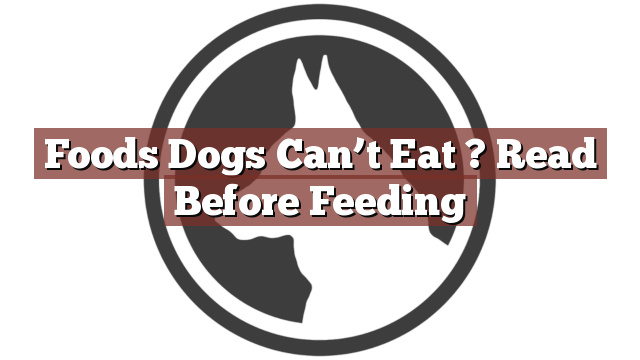Understanding Your Dog’s Dietary Needs
As responsible pet owners, it is crucial for us to understand our dog’s dietary needs. While dogs are known to have a diverse palate, not all foods are safe for them to consume. It is important to remember that dogs have different digestive systems than humans, which means that certain foods that are safe for us can be harmful or even toxic to them. Therefore, it is essential to educate ourselves on the foods that dogs can’t eat before feeding them anything.
Foods Dogs Can’t Eat? Read Before Feeding
Can dogs eat chocolate? No. Chocolate is a popular treat for humans, but it contains theobromine, a substance that is toxic to dogs. Consumption of chocolate can lead to symptoms such as vomiting, diarrhea, increased heart rate, and even seizures. It is important to keep all chocolate products, including cocoa powder and baking chocolate, out of reach of our furry friends.
Can dogs eat grapes? No. Grapes and raisins may seem harmless, but they can actually be highly toxic to dogs. Even in small amounts, consumption of grapes can lead to kidney failure, which can be life-threatening. It is best to avoid giving grapes or any grape-derived products to your dog.
Can dogs eat onions? No. Onions, along with garlic and other members of the allium family, can be toxic to dogs. They contain compounds that can damage the red blood cells and cause anemia. Therefore, it is crucial to avoid feeding your dog any foods that contain onions, such as onion powder or onion soup mix.
These are just a few examples of the foods that are not safe for dogs to consume. Other foods that should be avoided include avocado, alcohol, caffeine, and certain nuts like macadamia nuts. It is always better to err on the side of caution when it comes to feeding our furry friends.
Pros and Cons of Feeding Restricted Foods to Dogs
While it may be tempting to share our meals with our dogs, it is important to consider the pros and cons of feeding restricted foods to them. One potential benefit is that certain foods like fruits and vegetables can provide dogs with additional nutrients and fiber. However, it is crucial to ensure that these foods are safe and appropriate for their consumption.
On the other hand, the cons of feeding restricted foods to dogs can be severe. As mentioned earlier, certain foods can be toxic to dogs and can cause various health issues, ranging from gastrointestinal problems to organ failure. Additionally, feeding inappropriate foods can lead to obesity or malnutrition, both of which can have detrimental effects on a dog’s overall health and well-being.
Conclusion: Prioritize Your Dog’s Health and Well-being
In conclusion, it is vital to prioritize the health and well-being of our dogs by understanding their dietary needs and avoiding foods that can be harmful to them. When in doubt, consult with your veterinarian to ensure that the food you are considering feeding your dog is safe. Remember that even small amounts of certain foods can have severe consequences for our furry friends. By being proactive and educated about what foods dogs can’t eat, we can help keep our beloved pets healthy and happy for years to come.
Thank you for taking the time to read through our exploration of [page_title]. As every dog lover knows, our furry friends have unique dietary needs and responses, often varying from one canine to another. This is why it's paramount to approach any changes in their diet with caution and knowledge.
Before introducing any new treats or making alterations to your dog's diet based on our insights, it's crucial to consult with a veterinarian about [page_title]. Their expertise ensures that the choices you make are well-suited to your particular pet's health and well-being.
Even seemingly harmless foods can sometimes lead to allergic reactions or digestive issues, which is why monitoring your dog after introducing any new food item is essential.
The content provided here on [page_title] is crafted with care, thorough research, and a genuine love for dogs. Nevertheless, it serves as a general guideline and should not be considered a substitute for professional veterinary advice.
Always prioritize the expert insights of your veterinarian, and remember that the health and happiness of your furry companion come first.
May your journey with your pet continue to be filled with joy, love, and safe culinary adventures. Happy reading, and even happier snacking for your canine friend!

